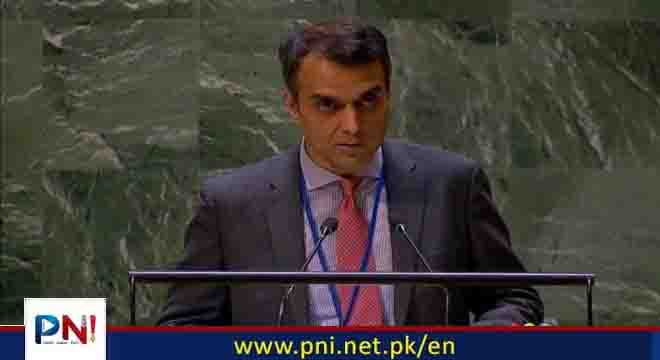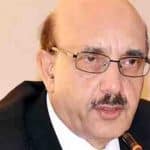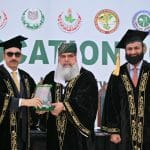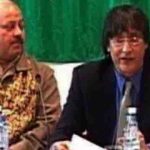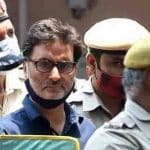UNITED NATIONS, Oct 23 : Pakistan has urged the international community to help in securing the right of self-determination for the Kashmiri people through a UN-sponsored plebiscite, as proposed by the UN Security Council resolutions, and to end human right violations in Indian Occupied Jammu and Kashmir.
At the same time, Ambassador Usman Jadoon, deputy permanent representative of Pakistan to the UN, spoke of the dire situation occupied Palestine where he said the people remain deprived of their basic human rights, including the right to self-determination.
“The expansion of illegal settlements, the use of excessive force by the Israeli occupation forces, and the blockade of Gaza are serious violations that demand immediate attention from the international community,” the Pakistan envoy told the General Assembly’s Third Committee, which deals with social, humanitarian and cultural matters.
“The crimes against humanity against the Palestinian people in the ongoing escalation must end”, he said in a debate on ‘Promotion and Protection of Human Rights’.
In Occupied Kashmir, Ambassador Jadoon said the use of excessive force, enforced disappearances, arbitrary detentions, and restrictions on freedom of expression have been documented in the reports of UN High Commissioner for Human Rights and of over two dozen special mechanisms of the Human Rights Council.
These violations, he said, intensified since India’s unilateral and illegal measures of 5 August 2019 designed to impose its ominous final solution on Jammu and Kashmir.
Noting that the international community often emphasizes civil and political rights, the Pakistani envoy said economic, social, and cultural rights remain under-prioritized.
“This imbalance is not only unjust but also perpetuates inequality,” he said, adding that the right to education, health, decent work, and an adequate standard of living are just as fundamental. Root causes of human rights violations must be addressed, such as poverty, hunger, and inequality.
“The current unequal focus on civil and political rights exacerbates the challenges faced by developing countries in meeting the Sustainable Development Goals (SDGs) and achieving meaningful progress on human rights.”
Pakistan, he said, fully supports the vision of the “Pact of the Future”, which the world leaders adopted last month, to renew multilateralism and reaffirm collective commitment to human rights, sustainable development, and global justice.
“A stronger, more inclusive multilateral system is critical to realizing the human rights aspirations of all peoples,” Ambassador Jadoon said.
To address these pressing challenges and move towards the full realization of human rights for all, he recommend that:
— The international community must prioritize the implementation of human rights conventions and resolutions;
— The protection of civilians, especially women and children, in conflict zones must be prioritized, and the perpetrators of war crimes and violations of international humanitarian law must be held accountable;
— The imbalance between the promotion of civil and political rights and the relative neglect of economic, social, and cultural rights must be addressed;
— Ensuring that the benefits of technology are accessible to all;
— The right to development must be reaffirmed as a universal and inalienable right, to address structural inequalities in the global economy, reforming international financial institutions, and ensuring fair trade practices that benefit developing countries, and,
— Strengthen international efforts to combat all forms of discrimination, including Islamophobia, xenophobia, and anti-migrant sentiments.
“Let us redouble our efforts to make human rights a reality for all, leaving no one behind,” Ambassador Jadoon dded.
The Pakistani envoy’s pointed word on the situation in Jammu and Kashmir drew a response from an Indian delegate following which her Pakistani counterpart exercised his right of reply.
Bhavika Mangalanandan, first secretary in India’s Mission to the UN, claimed that Jammu and Kashmir and Ladakh were an integral and inalienable part of India, and went on to accuse Pakistan of involvement in terrorism.
Pakistan hit back, saying the Occupied Jammu and Kashmir will always remain a disputed territory until the realization of the Kashmiris’ right to self-determination.
“The fact is that several UNSC resolutions attest to its disputed status,” Sarfraz Gohar, a first secretary in the Pakistann Mission to the UN, said, pointing out that India is an illegal occupier of the disputed territory.
India, he said, had reneged on its own promises made to the Kashmiri people when it unilaterally abrogated the constitutional status and some safeguards accorded to them. Defying these UNSC resolutions and the international human rights law only makes India a persistent violator of international law, the Pakistani delegate said..
About the “farcical” elections in Occupied Jammu and Kashmir, Gohar said they were not a substitute for the Kashmiri people’s right to self-determination.
Calling India as the epicenter of terrorism, the Pakistani delegate said the Indian leaders were pursuing a policy of state sponsorship of the menace, funding and arming terrorist organizations like TTP (Tehrik-i-Taliban Pakistan) and BLA (Balochistan Liberation Army) to launch terrorist attacks inside Pakistan, killing thousands of innocent women, men and children.
“India is churning out operatives of mayhem from its factories of terror,” he said, adding “Operatives like Commander Yadav, were spreading terror and violence across Pakistan, and that India’s terrorist franchise has now gone from regional to global.”
Gohar also referred to systematic discrimination, hate crimes and persecution of more than 200 million Muslims in the intolerant India.
“Public calls of genocide of Muslims; massacre in Gujrat, Mumbai and Delhi of thousands of innocent Muslims; forced conversions to Hinduism; lynching by cow vigilantes; desecration of hundreds of mosques, including the Babri Mosque and building of temples in their place; imposition of discriminatory Citizenship Amendment Act and love Jihad laws; and hate speech by political leaders, calling Muslims green virus has become a new normal in India.”
Follow the PNI Facebook page for the latest news and updates.


